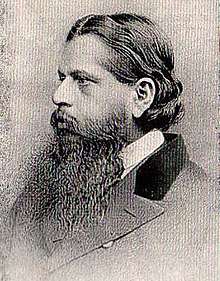Muthu Coomaraswamy
Sir Muthu Coomaraswamy (Tamil: முத்து குமாரசுவாமி; 23 January 1834 – 4 May 1879) was a Ceylon Tamil lawyer, writer and member of the Legislative Council of Ceylon.
Sir Muthu Coomaraswamy KCMG MLC MMC FRGS FGS | |
|---|---|
முத்து குமாரசுவாமி | |
 | |
| Unofficial Member (Tamil) Legislative Council of Ceylon | |
| In office 1861–1879 | |
| Preceded by | V. Edirmannasingham |
| Succeeded by | P. Ramanathan |
| Member of Colombo Municipal Council | |
| In office 1868–1873 | |
| Personal details | |
| Born | 23 January 1834 Mutwal, Ceylon |
| Died | 4 May 1879 (aged 45) |
| Alma mater | Colombo Academy |
| Profession | Lawyer |
| Ethnicity | Ceylon Tamil |
Early life and family
Coomaraswamy was born on 23 January 1834 in Amaittodam, Mutwal in south western Ceylon.[1][2] He was the son of Gate Mudaliyar A. Coomaraswamy and Visalachchi Ammaiyar.[1][3] From 1842 to 1851 he was educated at Colombo Academy where he won the Turnour Prize in 1851.[1][2][4]
Coomaraswamy married Elizabeth Clay Beebe, daughter of William Beebe from Kent, in 1878.[1][5] They had a son, Ananda Coomaraswamy, the eminent art critic.[1][6]
Career
After finishing school Coomaraswamy joined the Ceylon Civil Service as a cadet at the Colombo Kachcheri.[2][4] He was appointed police magistrate and was known as the "boy magistrate".[7] He resigned from the civil service after a short period.[2][7] He joined the legal profession as an apprentice under Richard Morgan.[2] He was called to the bar at the age of 22.[1]
Coomaraswamy was appointed to the Legislative Council of Ceylon in 1862 as the unofficial member representing Tamils, replacing V. Edirmannasingham.[2] He served on the Legislative Council until his death in 1879.[1][2] He was a member of Colombo Municipal Council from March 1868 to February 1873.[8]
Coomaraswamy went on a tour of Europe in 1862 during which he was admitted as a member of Lincoln's Inn on 10 July 1862, the first non-Christian/Jew to be done so.[1][3][9] He practised law in London.[10] His English translation of the Tamil play Harischandra (Martyr of Truth) was published in 1863.[1] Coomaraswamy took on the leading role when the play was performed in front of Queen Victoria on 8 December 1863.[1][11] He was elected an honorary member of the Royal Society of Arts and was a fellow of the Royal Geographical Society and the Geological Society of London.[12] He was also a member of the Athenaeum Club.[12]
After returning to Ceylon Coomaraswamy resumed practising law at the Colombo Bar.[13] He undertook research into oriental folklore before going on a tour of India.[1] His translation of the Pali text Datavamsa, the story of the Sacred Tooth Relic, and Sutti Nipaata, the discourses of the Buddha, were published in 1874.[1]
In 1878 Coomaraswamy became the first Asian knight after being made a knight of the Order of St Michael and St George by Queen Victoria at Osborne House.[1][3][14][15] He died on 4 May 1879 of Bright's disease whilst preparing for another tour of England.[1][16]
Notes
- Arumugam, S. (1997). Dictionary of Biography of the Tamils of Ceylon. pp. 42–43.
- Muttucumaraswamy 1973, p. 13.
- Muttucumaraswamy 1973, p. 12.
- Vythilingam 1971, p. 109.
- Muttucumaraswamy 1973, p. 23.
- "Going against the stream". The Sunday Times. 10 August 2003.
- Vythilingam 1971, p. 110.
- Hulugalle, H. A. J. (September 1965). Centenary Volume of the Colombo Municipal Council (1865–1965). Colombo Municipal Council. p. 55.
- Muttucumaraswamy 1973, p. 14.
- Vythilingam 1971, p. 111.
- Muttucumaraswamy 1973, p. 15.
- Vythilingam 1971, p. 113.
- Vythilingam 1971, p. 114.
- Muttucumaraswamy 1973, p. 31.
- Vythilingam 1971, p. 125.
- Muttucumaraswamy 1973, p. 25.
References
- Muttucumaraswamy, V. (1973). Founders of Modern Ceylon. Uma Siva Pathippakam.
- Vythilingam, M. (1971). The Life of Sir Ponnambalam Ramanathan 1.